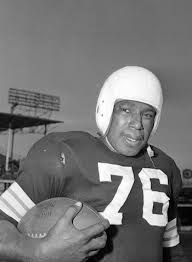“The Forgotten Legend: Marion Motley and the Silent Sacrifice Behind the Browns’ Legacy”
Before the Cleveland Browns ever dreamed of billion-dollar stadiums, primetime spotlights, or quarterback controversies, there was a man who silently bulldozed the path forward — a trailblazer in cleats whose name deserves to be shouted from rooftops. Marion Motley, the bruising fullback with lightning speed and unshakable courage, didn’t just carry the football — he carried an entire generation of hope, breaking racial barriers and flattening defenders at a time when being Black in professional sports meant fighting two battles: one on the field, and another just to exist on it. Today, as the Browns continue chasing glory, it’s time to remember the unsung hero who helped build the franchise’s soul.
The Origins of Greatness
Born in 1919 in Leesburg, Georgia, and raised in Canton, Ohio, Marion Motley’s early years were shaped by steel-town grit and raw athleticism. After starring in high school, he played college ball at Nevada — a rare stage for a Black athlete at the time. But it was during World War II, while stationed at Great Lakes Naval Training Station, that Motley met Paul Brown, the coach who would later transform his life and the Cleveland Browns.
When Brown was assembling the Cleveland Browns for the newly formed All-America Football Conference (AAFC) in 1946, he called Motley. It was a bold move — professional football was still segregated. But Brown didn’t flinch, and neither did Motley.
Breaking Barriers — and Tackles
Motley debuted with the Browns in 1946, becoming one of the first African Americans to play pro football in the modern era, alongside teammate Bill Willis. They joined a league that had unofficially blackballed Black players since the 1930s. What awaited them was hostility, racism, and danger.
Motley endured slurs hurled from the stands, teammates giving him the cold shoulder, and defenders targeting him with vicious intent. But he never flinched. His response came in the form of unstoppable runs, blindside blocks, and sheer willpower.
📈 Dominance on the Field
In 1948, Motley led the AAFC in rushing with 964 yards, helping the Browns finish a perfect 15-0 and win the league title.
After the Browns joined the NFL in 1950, he continued his dominance, leading the league in rushing at age 30 — becoming the first Black player to do so.
He averaged an astonishing 5.7 yards per carry over his career, a number that still ranks among the greatest in pro football history.
Motley wasn’t just a power back. He could cut like a halfback, block like a lineman, and run like a freight train. Teammates and opponents alike admitted — no one wanted to tackle him.
The Forgotten Greatness
Despite his greatness, Motley faded from the spotlight far too soon. After retiring in 1955, he struggled to find opportunities in coaching, despite his vast football IQ — a common fate for Black players in that era.
In 1968, he was inducted into the Pro Football Hall of Fame, but without the fanfare or attention other legends received. The NFL celebrated his numbers, but rarely his courage.
Motley lived out his later years in quiet dignity, watching football evolve into a global empire, often without the world knowing he was one of the men who made it possible.
Legacy That Lives On
Today, as the Browns chase new beginnings, Marion Motley’s name deserves to be etched into every chapter of the team’s legacy:
He helped shape four AAFC titles and an NFL Championship.
He broke racial barriers a full year before Jackie Robinson debuted in MLB.
He showed the world that greatness has no color — only character.
In 2021, the Hall of Fame introduced the “Marion Motley Award”, honoring those who break down barriers in the spirit of his sacrifice. But still, his name is too rarely spoken in comparison to what he gave the game.
Final Word: A Legacy Built on Strength

“They called me every name in the book. But when the game was over, they always said, ‘Damn, that Motley can play.’”
Marion Motley
In a franchise known for heartbreak and rebuilding, Motley’s story isn’t just one of strength — it’s the blueprint. Before Baker, before Bernie, before Watson or Wembush — there was Motley. And his legacy is not lost. Not here. Not now.






















